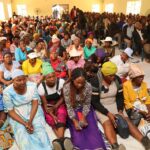Nyanga – The Zimbabwe Electoral Commission (ZEC) concluded a two-day post-election review conference in Nyanga this week, a gathering that saw heated debate over the 2023 harmonised elections and the path forward for electoral reform.
The conference, attended by over 160 stakeholders, including representatives from political parties, churches, embassies, the police, civil society organisations, and constitutional commissions, served as the official launch of preparations for the 2028 elections.
ZEC chairperson, Justice Priscilla Chigumba, opened the conference, stating that the review aimed to identify areas for improvement and inform future electoral reforms. She described the conference as an “anxious moment” for her, expressing relief at its conclusion.
The review process, according to ZEC vice chairperson Ambassador Rodney Kiwa, extends beyond the conference itself, with an open invitation to Zimbabweans to submit their contributions to ZEC.
While government and quasi-government representatives largely praised ZEC and the police for conducting successful elections, a chorus of dissenting voices emerged from civil society organisations, opposition parties, journalists, and others.
Elisabeth Valerio, president of the United Zimbabwe Alliance (UZA), strongly criticised ZEC, accusing it of bias and unfairly disqualifying hundreds of her party’s candidates. She also levelled harsh criticism at the police, alleging a pro-ruling party (Zanu-PF) bias.
Journalist Tonderai Toneo Rutsito of Techmag directly challenged Police Commissioner Godwin Matanga on the disparity in the treatment of political rallies, questioning why Zanu-PF meetings were consistently sanctioned while numerous CCC meetings and rallies were banned. He also raised concerns about the lack of publicly accessible Presidential results on the ZEC website. Another journalist criticised ZEC for its limited accessibility to the media.
The conference also highlighted several key areas needing attention. CCC MP Charles Moyo advocated for the automatic voter registration of all 18-year-olds. Zimbabwe Media Commission senior official Academy Bvumayi Chinamhora urged ZEC to adapt its media strategy to the digital age, acknowledging the declining reach of traditional media and the growing influence of digital platforms, particularly in light of the Starlink licensing.
Women’s organisations called for stronger measures against political parties failing to meet the 50/50 gender quota, including rejecting their registration.
ZEC CEO Utoile Silaigwana attributed many of the criticisms levelled against the commission to shortcomings in the existing electoral law.
“ZEC only acts within the law and will not do anything that is not provided for in the statutes. Those blaming ZEC should instead convince the legislature to reform the laws,” he stated.
He also emphasised that enabling Diaspora voting requires legislative changes.
ZEC lawyer Tawanda Kanengoni, who presented twice at the conference, highlighted the need for clearer electoral legislation, pointing to numerous ambiguities that disrupt the electoral process. He advocated for the establishment of an Electoral Court to address these issues.
The call for an Electoral Court reflects a broader concern about the need for greater transparency and accountability in the electoral process. The lack of transparency in the tabulation of the Presidential vote was a recurring theme, with several participants expressing concern about the lack of readily available information and the need for greater public access to election data.
The call for extending voting rights to Zimbabweans living abroad also gained significant traction, reflecting the growing desire for broader participation in the democratic process. The conference served as a platform for airing these concerns and initiating a dialogue on necessary reforms.
The coming years will be crucial in determining whether these calls for reform will translate into tangible changes in the electoral system ahead of the 2028 elections.

Follow @MyZimbabweNews












